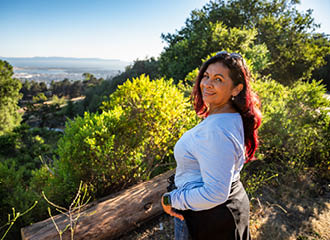Veteran Overcomes Her Fear of Mental Health Care
5-minute read
Veteran Overcomes Her Fear of Mental Health Care
5-minute read
For 10 years, Jo resisted the advice of a flight nurse in her Air Force unit, who urged her to seek mental health support through VA. Jo, an aeromedical evaluation technician, lived through a massive terrorist bombing at her barracks in Saudi Arabia in 1996, and the nurse understood that Jo still felt the effects of that experience. But Jo felt intimidated by what she thought of as “big, scary VA.”
What changed her mind? In part, it was her colleague’s persistence. Jo says it also was because, after she enrolled with VA, she asked for and received care specifically from women providers — a type of support that she knew would make her feel more comfortable. That comfort, in turn, helped her open up about her feelings and experiences.
Responding to a peacetime attack
Jo began her Air Force career in 1991. Her peacetime deployment to Saudi Arabia should have been uneventful, but in 1996, a truck bombing at her barracks killed 19 service members and injured about 500 people.
Separated from the other members of her medical team at the time of the explosion, Jo took charge of triage in her area. Then a senior airman, Jo cared for hundreds of people throughout the night.

“You just continually heal.” Veteran Shares How Women’s Therapy Groups Helped Her Rebuild Her Life
“It was a night that I will never forget,” Jo says.
That night helped Jo find her purpose. She discarded her initial plan to serve for four to six years only and ended up staying in the Air Force for more than 26 years. However, the experience also affected her in other ways and contributed to what would later be diagnosed as posttraumatic stress disorder.
Advocating for her needs in receiving mental health care
Jo felt intimidated by the idea of seeking mental health care through VA. “That’s how I felt it was at the time — very intimidated and very scary to go in to seek help,” she says. “And of course, you always think, ‘No, I’m OK, I don’t need to go. I don’t need to talk to anybody.’”
She turned the corner and faced her fear by advocating for herself.
“I learned early on that to receive the medical care you want and deserve, you have to be your own best advocate,” Jo says. “And that doesn’t mean always complain. That means, just ask for what you want. And if you don’t get it the first time, just ask again.”
Jo, as it turns out, didn’t have any trouble getting what she wanted. She requested what she knew would make her most comfortable: women care providers.
“Once I enrolled, I felt very confident because I requested to see female providers, and that really helped me to continue my visits,” she says. “I visited a psychologist, psychiatrist, and everybody was female. I also got into a female Veteran group. And from there, it was gravy.”
Jo says the women’s group made her feel at home. Its members were Veterans from different eras of service and branches of the military, but the women connected over shared interests and experiences.
“Our experiences were very similar. And not only that — we understood each other,” Jo says. “All the females in that group bonded. I have very many friends from the group, still to this day. And we still provide each other support.”
Benefiting from treatment
Jo’s transition out of the military was difficult. She says her family didn’t understand her experiences or why she was hypervigilant and refused to go to certain places at certain times. Her mental health treatment has helped her adjust and learn ways to cope.
Jo found group therapy the most helpful, and she continues to receive treatment as needed. “You just continually heal,” she explains. She also finds that she benefits from quiet time, like when she takes nature walks or watches waves from the beach.
Now, on the anniversary of the bombing, instead of fully isolating the way she used to — sometimes spending all day in bed — Jo gets up, writes in her journal, talks with other Veterans and finds ways to honor the fallen and turn the day into one of remembrance.
Jo continues to feel supported by friendships and relationships, including those she made following her decision to seek help through VA.
“I have a group that came out of VA, and we don’t only surf together, but we volunteer together. We do different things to help other Vets,” she says.
“Seeking help is not as intimidating as you think,” she adds. “I found, through seeking help, you also gain a village of friends that will always lift you up.”

